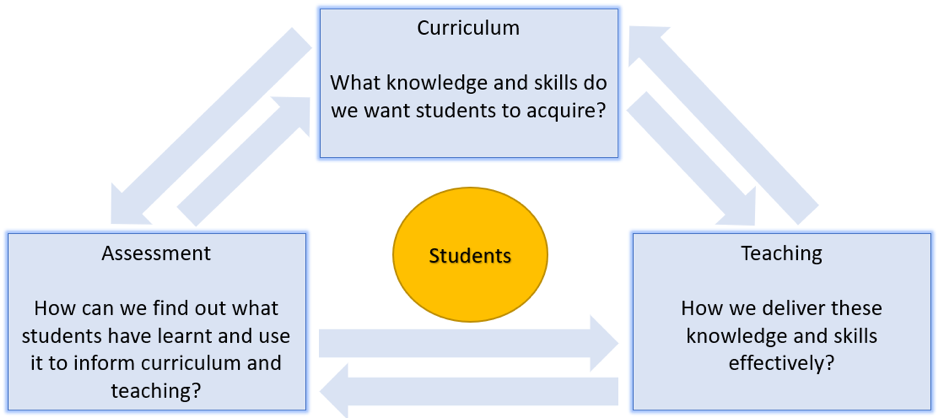- Home
- Curriculum
- Curriculum Overview
Curriculum Overview
We offer a diverse and exciting curriculum, consisting of different pathways to help meet the individual needs and aspirations of our students.
The curriculum outlines the key knowledge and skills that students need to learn over their time with us in order to be successful; this will then drive what and how (pedagogy) we teach. A challenging curriculum will require students to think deeply about the subject and lesson content.
Quality of Education

Curriculum, teaching and assessment are inextricably linked. When all three are aligned and of the highest quality, they should facilitate effective learning for all students, irrespective of their starting points. In turn, this should translate into all students making good progress and achieving strong academic outcomes.
This matters, because it gives students the best possible life chances.
Curriculum Organisation
The school is committed to providing students with the broadest learning opportunities for as long as possible whilst maximising the huge range of subjects the school offers.
Homewood curriculum is organised as a hybrid three Year Key Stage 3, with students choosing foundation pathways in Year 9. Key Stage 4 (Level 2 study) is two years. The Sixth Form offers a range of courses suitable for all students to succeed.
Homewood Curriculum Map Year 7Homewood Curriculum Map Year 8Homewood Curriculum Map Year 9
Subject Timetable Allocations
All lessons are 55 minutes in length
| Years 7 and 8 | |
|---|---|
| Subject | Number of lessons per week |
| English | 4 |
| Maths | 4 |
| Science | 4 |
| Geography | 2 |
| History | 2 |
| Modern Languages | 3 |
| Art | 2 |
| Music | 1 |
| PE | 2 |
| Dance | 1 |
| Drama | 1 |
| Computer Studies | 1 |
| ERS | 1 |
| PSHE | 1 |
| Year 9 | |
|---|---|
| Subject | Number of lessons per week |
| English | 4 |
| Maths | 4 |
| Science | 4 |
| Geography | 3 |
| History | 3 |
| Modern Language | 3 |
| PE | 1 |
| PSHRE | 1 |
| Pathway 1 | 2 |
| Pathway 2 | 2 |
| Pathway 3 | 2 |
| Years 10 and 11 | |
|---|---|
| Subject | Number of lessons per week |
| English | 5 |
| Maths | 5 |
| Science | 5 |
| PE | 1 |
| PSHRE | 1 |
| Option A | 3 |
| Option B | 3 |
| Option C | 3 |
| Option D | 3 |
| Years 12 and 13 | |
|---|---|
| Subject | Number of lessons per week |
| Option A | 4 |
| Option A Study | 2 |
| Option B | 4 |
| Option B Study | 2 |
| Option C | 4 |
| Option C Study | 2 |
| Option D | 4 |
| Option D Study | 2 |
| PSHRE | 1 |
| Assembly | 1 |
Teaching (Pedagogy)
The curriculum outlines the key knowledge that students need to learn and skills they need to master over their time with us in order to be successful. Effective teaching leads to students acquiring, retaining and applying this curriculum knowledge and skillset in the classroom and beyond. Learning happens when students connect new content to what they already know.
Teaching at Homewood is grounded in the Homewood Pedagogical Principles (HPP).
Remote Education Provision
What is taught to students at home?
We teach the same curriculum remotely as we do in school wherever possible and appropriate. However, we have needed to make some adaptations in some subjects. For example, science experiments will not take the same format if the student were to be taught in a science laboratory.
How long can I expect work set by the school to take my child each day?
We expect that remote education will take students broadly 5 hours each day.
How will my child access any online remote education you are providing?
Work to be completed is placed on our Google Classroom. Every subject area has a different access code so that teachers can place set work under their specific subject areas
If my child does not have digital or online access at home, how will you support them to access remote education?
We recognise that some students may not have suitable online access at home. We have a limited number of laptops available in school to loan to students who require them. Any loaned device needs to be requested in advance (at least 3 days). All devices must be returned to the Media Centre upon their return to school. More information about this can be obtained from e-learning@learning.kent.sch.uk
How will my child be taught remotely?
We use a combination of the following approaches to teach students remotely:
-
live teaching (online lessons)
-
recorded teaching e.g. video/audio recordings made by teachers
-
printed paper packs produced by teachers (e.g. workbooks, worksheets)
-
textbooks and reading books students have at home
-
commercially available websites supporting the teaching of specific subjects or areas, including video clips or sequences
-
long-term project work and/or internet research activities
What are your expectations for my child’s engagement and the support that we as parents and carers should provide at home?
As with all of your child’s academic work, we would expect parents and carers to provide support. This may include the setting of routines and assisting with task explanations as appropriate.
How will you check whether my child is engaging with their work and how will I be informed if there are concerns?
We will inform you if work is not completed or if your child’s effort has been poor.
How will you assess my child’s work and progress?
We use a number of feedback approaches with Remote Learning. These include:
-
whole-class feedback or quizzes marked automatically via digital platforms
-
The marking of written assignments on the Google Classroom
How will you work with me to help my child who needs additional support from adults at home to access remote education?
We recognise that some students, for example some students with special educational needs and disabilities (SEND), may not be able to access remote education without support from adults at home. We acknowledge the difficulties this may place on families, and we will work with parents and carers to support those students. Please contact your child’s Community Office should you have any questions or concerns about this.

